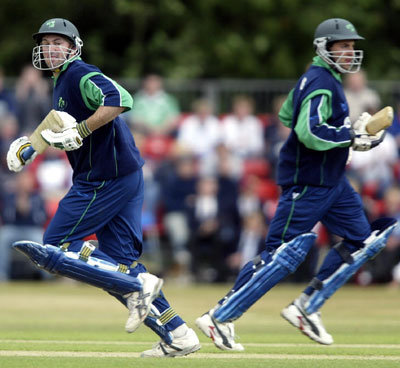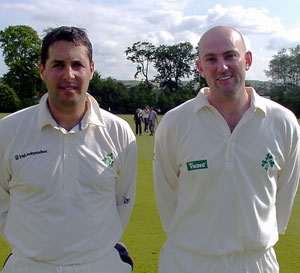
There were two matches -v- Zimbabwe and one -v- South Africa. Zimbabwe had played two Test Matches in England and lost both heavily. They returned from Ireland to play a triangular limited overs tournament against England and South Africa. In contrast South Africa began their tour in Ireland and went on to the triangular tournament followed by five Tests v England .
Ireland selected a party of 12 for these three matches. They were JAM Molins ( Capt.), CN Armstrong, AC Botha, JP Bray, PG Gillespie, DI Joyce, WK McCallan, JP Mooney, PJK Mooney, GJ Neely, NJ O'Brien and AR White.
It seemed the Selectors were intent on playing JD Curry because they announced that he was not available due to work. Curry had not played since Toronto in 2001 and Botha, due to injury was superceded by Bray as the unqualified player allowed -v- Berkshire in 2002. Now both Bray and Botha were qualified to play for Ireland by residence.
Seven players who played for Ireland in 2002 were not in the above panel of 12. They were PJ Davy (whom Joyce must have just pipped for a place); D Heasley, DS Kennedy, AGAM McCoubrey (now contracted to Essex), RW McDaid, WJ McGonigle and AD Patterson (now retired). O'Brien is now contracted to Kent but was released for these games.
The same Irish XI played in all three games - JF Mooney being left out of all three. Zimbabwe had a squad of 16 players for the triangular Tournament. They made a terrible mistake in leaving out five leading Test Match players from this first match at Stormont. They were the Captain, HH Streak, S Carlisle, G Flower, A Blignaut and R Price. Included were four players who had not played Test Cricket - C Coventry, R Sims, W Mwayenga and S Matsikenyeri. Zimbabwe were captained by the tiny and youthful Taibu - the wicket-keeper.

The pitch at Stormont looked and felt hard but, after much rain in the previous month, was probably soft underneath. It certainly played so. Ireland sent Zimbabwe in. Mooney's third ball bowled Marillier hitting off stump. He was hitting towards leg with head up and the ball moved away a bit.
Coventry joined Ebrahim (an experienced player). Coventry hit an offside four and Ebrahim snicked a four off Neely. The third ball of Mooney's second over bowled Coventry. It was well pitched up and he was driving it. Neely joined the wicket taking in his second over. Again it was the third ball, it was well pitched up to Sims. It left him off the pitch and Molins caught it, waist high, at first slip.
Matsikenyeri joined Ebrahim for easily the best stand of the innings. They added 96 and the stand lasted from the fourth over to the last ball of the 30th over. There was a lot of playing and missing and two near run outs. Gillespie threw down the non-striker's wicket in the 11th over and almost ran out Ebrahim and Molins did the same from square leg in the 24th over with Matsikenyeri the near victim. Armstrong was tried for the 16th over for Neely and 50 came up in this over. Botha, 17th, replaced Mooney. Both bowled six overs but gave away 51 runs with Matsikenyeri hitting Armstrong for a six over long-on in his last over.
Spin was now tried. White came on for over 28 (in which 100 came up) and McCallan for the 29th. In the latter over Matsikenyeri went to 50 out of 102 off 61 balls. He did not add to his score. In White's next over he set off down the pitch, missed, and was stumped. Taibu, the small, youthful wicket-keeper who was captaining the side, was next. Ebrahim went to 51 with a two in over 34. Having added another run he was out to McCallan. He stepped back to cut a ball that was too near him and played on.
Two overs later the newcomer, left hander Ervine, was run out for nought. Botha threw from mid-wicket to the bowler, McCallan, and foiled an attempted single. Friend joined his captain and 37 runs were added in just over seven overs - the second best partnership of the innings. The feature was a six over mid-wicket by Friend off White. 150 was up in over 43. The spinners bowled 17 overs between them and gave up 62 runs for two wickets -White being slightly more expensive. Botha and Neely returned and the latter had Friend caught at the wicket in the first over of his return.
The last three wickets fell for 11 runs. Botha caught and bowled Brent - a brilliant low right handed catch. Two overs later Taibu was out for 35 (59 balls and no fours). He improvised by going outside off-stump and hoisted to fine leg (Armstrong) who had come up. Armstrong ran back and caught a good running catch. Finally Mwayenga drove a full toss from Neely to deepish mid-off where again Armstrong obliged. Mooney, two for 19 in eight overs, was, surprisingly, not brought back. Neely and McCallan went at three runs per over with the former getting three for 30 in 9.5 overs. The bowling was accurate, only five wides, and the fielding was excellent. Only nine fours were hit and two sixes.
Ireland's opening pair made light of the 183 run task and the win came in 33.4 overs. Molins made his second century for Ireland, the two coming over the last three matches (2002-'03). Three sixes were hit and 23 fours. So 110 of 183 came in boundaries. The 183 run opening stand was the second best ever, inching out, by one run, the stand in Cork -v- MCC in 2002 by N.J.O'Brien and A.R.White. The 224 run stand in 1990 -v- Wales at College Park (three days) by S.J.S.Warke and M.P.Rea stands supreme.
Zimbabwe tried eight bowlers. Two of them, Hondo and Brent, bowled seven overs each. The other six amassed 19.4 overs between them. The pitch appeared to have become easier. However this may have been deceptive because Molins and Bray batted better than any Zimbabwean and the Irish bowling and fielding had also been much better.
The first over from Honda to Molins was a maiden. Bray straight drove a four in Mwayenga's first over. Molins took six off the third over including an off driven four. The fourth over was a maiden to Bray. In the fifth Molins flashed dangerously but got a four. Then came an avalanche of fours. In five overs seven fours were hit including three in one over by Molins off Mwayenga's fourth and last over.
 They changed ends for the first time in the seventh over and in the midst of this plenty the ninth over (Hondo) was a maiden. Brent replaced Mwayenga for the 10th over. Brent it was who gave away two of above mentioned seven fours - the second of which brought up 51, and these off Brent's first two balls and struck by Bray.
They changed ends for the first time in the seventh over and in the midst of this plenty the ninth over (Hondo) was a maiden. Brent replaced Mwayenga for the 10th over. Brent it was who gave away two of above mentioned seven fours - the second of which brought up 51, and these off Brent's first two balls and struck by Bray.
Marillier came on with off spin for the 15th over. He replaced Honda who gave up three fours in the 13th over. Molins now raced away from Bray (but he got more strike) and went to 50 out of 81 in the 17th over having faced 67 balls and hit eight fours. The first chance was offered in the 19th over. Marillier to Molins. It was a high difficult chance to mid wicket who could not hold on. Molins was on 50. In the next over (Brent) Bray hit to mid-off who dived to his left but dropped it. Bray was 31.
Molins greeted this mistake by hitting Brent's next ball for a straight six. In the next over Molins hit another six over mid-wicket to bring up 100 in 123 balls. This over (Marillier) cost 16 runs, 15 of them to Molins. Two new bowlers were tried - Friend for the 23rd over and Ervine for the 24th. Six fours were hit in their first three overs, four by Molins and two by Bray. Molins's fours were twice hit off successive balls. By now Molins was 91 after over 24. Heroics ceased as he eased his way through the 90's until over 29 when he late cut Friend for a four to bring him to 102 out of 163 off 102 balls in three minutes under two hours.
Meanwhile Bray had gone to 50 out of 150 in over 27 off 65 balls. Bray hit his first six in the 30th over. It went over long-on off another new bowler - Sims (off spin). In over 31 (Friend) Molins hoisted to deep long leg but the fielder could not run in quickly enough to balance himself and make the catch.
Three runs later the match was over. No bowler took a wicket but Brent's seven overs cost only 28 runs. Molins (107*) won the Champagne Award for the Man-of-the-Match as decided by the Pressmen. He faced 119 balls, batted 135 minutes with two sixes and 14 fours. Bray's 67 came in 86 balls, with one six and nine fours. It was his second match for Ireland.
Beating a Test country by 10 wickets was a "first for Ireland". In 1969 at Sion Mills the win was by nine wickets against West Indies.
